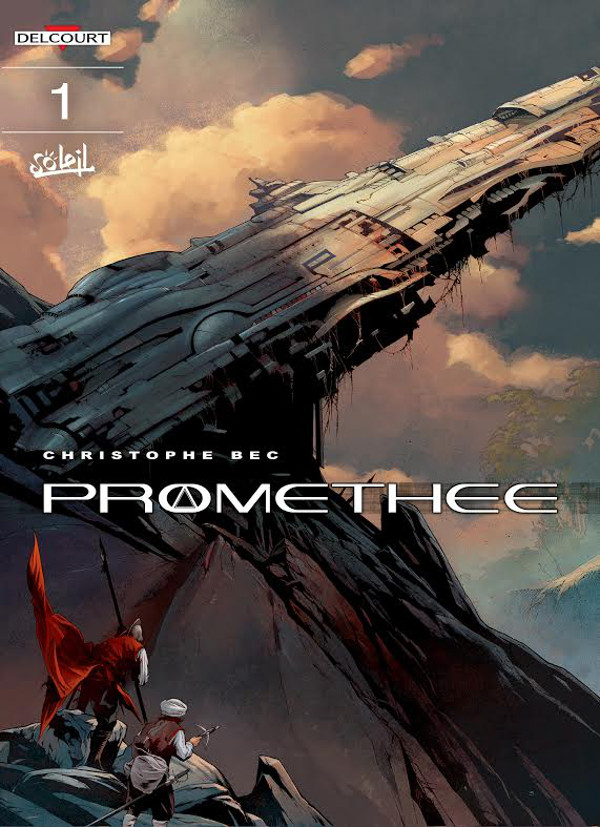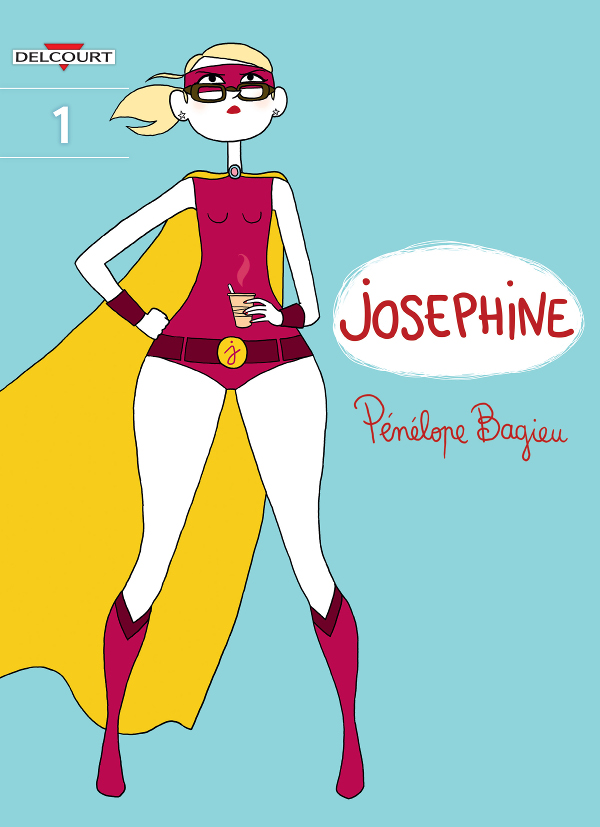
July 18, 2015
 CR Newsmaker Interview: Guy Delcourt
CR Newsmaker Interview: Guy Delcourt



*****

I was one of several journalists offered an interview with publisher
Guy Delcourt at the 2015 version of
Comic-Con International. The reason for his availability was
a newly announced deal between his company and the digital comics service
comiXology for the latter to provide a significant amount of translated work to English-language audiences. It's a deal that speaks well of comiXology's under-appreciated strength in the French-language market, one of the accomplishments they've since leveraged into their current place of significance within the digital comics world. We spoke in one of comiXology's rooms built into their booth as a major
G. Willow Wilson signing came to life outside the booth, a few yards from where we sat.
I rarely do interviews at shows like Comic-Con as I'm usually too distracted and tired to be as articulate as I need to be, but I wanted to meet Delcourt after hearing about him for several years and I think this story an intriguing one. I'm grateful to
David Hyde for granting me the opportunity, and to Delcourt for his patience with how I pronounced the names of French cartoonists. -- Tom Spurgeon
*****
TOM SPURGEON: You're a part of this story, or at least how it's been presented to US press. You have a unique position within French comics publishing. You own Delcourt; it's not owned by a media conglomerate.
GUY DELCOURT: No.
SPURGEON: How does that position make a deal like this one more attractive or perhaps easier to do? What is it about your position in the French marketplace that makes you the first publisher to strike such a deal?
DELCOURT: It's easier in terms of speed of decision. I met David Steinberger three and a half years ago. We hit it off very quickly. I was convinced by his vision for expanding the field of comics through digital. His willingness to go to Europe and give us better access to the digital world, with a whole way of doing things... what is the system called?
Guided view. The guided view system. I thought that very efficient. Very clever. And so I wanted to be the first French publisher to sign with them. So we did that, what, within two months. My being independent helps decisions get made quickly.
SPURGEON: Can you talk a bit more about what was attractive to you about comiXology as they came into the European market, what was there that wasn't being offered by a European digital company? Why isn't there a European comiXology?
DELCOURT: There are a number of European companies of course selling digital comics. The fact that comiXology specializes in comics, that they have the guided view system, that puts them above the rest, I think. Their experience in the US with digital comics, in a place where they are much more popular than they are in France, that was attractive in order to increase our sales. It's still a very small market, less than one percent of our sales. [laughs] Very small. To me, they're a good guide with which to expand into digital comics.
SPURGEON: I talked to a couple of booksellers who were confused about what might be offered in this new deal and when, so I wanted to take that directly to you. Will Lewis Trondheim's line, Shampooing, be part of that initial offer, or are they planned for an early stage of release with this program?
DELCOURT: No. We have chosen a start, and what I mean as a start is 150 books for each year. We have a two-year program so far. We have comics geared towards an adult readership. One line is
entertaining comics, I would say: horror, sci-fi, fantasy; things that are generally familiar to Americans but done in a different way, perhaps, with a different touch. The artwork may be very detailed, the French-sized pages are bigger than US-sized. There's a different approach, a richer approach to art. And we have graphic novels, also geared to adults. But of course that's only part of our catalog.
Trondheim's books are not there yet because I think he's one of the creators who are a little cautious about digital comics. My hope is that this will help convince him and other creators in France that going into digital is a good thing. It's certainly timely for us because I've been trying for years to have more and more books available in English in America and it's been very disappointing so far. It's been very limited.
SPURGEON: Why do you think that is? I know there are people all throughout the French-language industry who would love to see deeper penetration into the English-language market, and I'm even aware of a push at the ministry of culture level for BD to have the same level of penetration here as manga has. Why in general do you think we haven't seen that broader effort catch fire here?
DELCOURT: First of all, manga is very marketed. It's a whole bunch of work, with a lot of similarities, and it's propelled by movies, television series, anime, whatever. That's not the same of France. France is more of an industry, more a collection of individual stories and books than a big group. That's one big difference. The other thing is that the French-sized album in print is so different than the US-sized comics that it's difficult to penetrate. I think that comic book shops don't know what to do with them. They don't fit into their racks. They're not easy to market. Because they are series, there's a risk in taking volume number one, number two, number three. If it catches on with number four, you have to buy back issues, which may not be easy because print runs aren't great. There are cultural and technical differences that have made it difficult. Digital, of course, makes everything different.
 SPURGEON: You mentioned Trondheim and other cartoonists as being
SPURGEON: You mentioned Trondheim and other cartoonists as being reluctant
to enter into digital... does that mean the cartoonists you're bringing over with the groups of 150 books, does that mean they're pro-digital cartoonists? What has been the reaction with the cartoonists that are participating?
DELCOURT: Because of the way we work with artists and also because of the laws in France, we have to ask each individual if they agree. [pause] It's a lot of work, yes. [laughter] Some are immediately enthusiastic, like
Jean-Luc Sala, the writer of this
Iron Squad and others. Others have been a little reluctant. Others are completely scared of digital. For us, it's great, because it's an ongoing process to talk to them. We learn from examples. Once we get going, I'm sure there will be people jealous of the first books in English.
It's my hope that more and more we'll be at ease with digital comics. Most are enthusiastic because having your books available in English is great. You reach six times, seven times as many people as in France, and you're reaching professionals in movies and in TV, individuals that may want to adapt your work.
SPURGEON: The conventional wisdom about the French-language market over the last 15 years is that the market is oversaturated on a title-to-title basis, and that as more and more books are published this has an effect on driving down the sale of individual books even as the industry overall may gain. Does this play into your desire to find another market for these books? Is this an advantage you can offer creator to creator, book to book, this ability find extra sales per project? Is that a motivation for you in seeking out this deal?
DELCOURT: It's a very good question. It may have played a role. It's true that in France sales are kind of plateauing, and the number of releases also. It's a stable situation, but as a businessman you're always looking for extra sales, extra profit. So that may have played a part. The main thing is that I've been trying to supply an international dimension to my company for years. Again, print is very difficult for that. It's too risky, too complicated. Digital may open a big door for us. I wanted to be the first to open that door.
SPURGEON: Let me ask you about print. Is there any worry at all that digital ends certain opportunities for print? I know that some booksellers worry because sales might be limited in print overall, that a move to digital may remove opportunities for them to work with select titles and authors that do well in their individual stores. Are you in any way giving up on certain print initiatives in the US?
DELCOURT: Not at all. First of all, what is true is that we have so few books available in print in the US that economically... yeah. We cannot let that hinder us from doing what we're doing. On the other hand, my hope is that digital editions of our books will make more US publishers more aware of them. I was talking to one of them just an hour ago. I said, "Hey, I would be glad to do print editions of some of our most successful books." In a way, digital editions work as a market test, to see what works best. For those, print editions could be envisioned with US publishers. So I'm sure we'll gain something from this.
 SPURGEON: If I remember correctly, you guys do the print editions of the diary comics by Bastien Vivès.
SPURGEON: If I remember correctly, you guys do the print editions of the diary comics by Bastien Vivès.
DELCOURT: Oh, you're very knowledgeable. Thank you. Yes. We do.
SPURGEON: Is there a chance a deal like this drives digital-to-digital publishing for you?
DELCOURT: It's a strange world. One of the first we're doing,
Josephine by Pénélope Bagieu, was initially done on a blog. She's a most famous French blogger, you know? Then it was turned into print. Now we have it digital in the US. I think it says a lot about how flexible we have to be now.
SPURGEON: Do you ever see a day where you don't have print in there somewhere?
DELCOURT: I don't. At least in France, I absolutely don't, I think. Digital is still under one percent of our global sales. It's really small. I see that growing of course, but I don't see print disappearing. We have so many great bookshops. Comic shops and the best book shops have never done better in France. The middle is kind of down, but the best book shops are thriving. I see the market as remaining strong in print, complemented by digital. In the US, I'm too new to the game to say.
SPURGEON: How are you handling all of that translation work? I should know this, but is that coming from you guys?
DELCOURT: It's from us. Not in-house, but we hire translators. We are used to translation problems because we translate so much work into French. Whether it's
Bone, or
Walking Dead, or
Hellboy or
Star Wars or
Chris Ware's books. We're used to the demands of good translation, which is very difficult. We hired American born translators. We have the translations checked by other translators to make sure it flows well, and we continue working on them because with digital you can improve a translation even after release! If a sentence doesn't ring true, we'll change it. We're talking about that right now. Nothing's ever perfect. We will always improve translations.
SPURGEON: I'm not sure how much you can or are willing to talk about this part of it, but do you have specific expectations going into this deal, and are any of those expectations structurally present in the deal you made with comiXology? Do you need to see a certain level of sales? Is that part of your contract? If not, is that part of the way you look at this deal moving forward? Do you have a figure in mind to judge how this is or isn't successful?
DELCOURT: We do, of course. We cannot go blind into this. We have a business plan, I should point out, based on very reasonable numbers. That's something we worked out with comiXology. One reason this deal couldn't have been made without comiXology is we did need their expertise in deciding which titles might work. We asked them to make sales provisions... but low key. [laughter] We also know we have to stay in the market at least two or three years before assessing if it is working or not. Success, if it comes, will not come overnight. So we're prepared for a very long run, for this to be a very long term commitment. It's very important to us. The US comics culture is very important to France... we're moving into a more global comics culture. French creators are influenced by comics creators and also the same movies and tv shows and novels everybody is watching from all over the world. While there are still individual voices, I think there is a common ground that is stronger and strong now.
 SPURGEON: When you are putting together your group of comics for this program, did you exclude any comics because they were too French?
SPURGEON: When you are putting together your group of comics for this program, did you exclude any comics because they were too French?
DELCOURT: My fear was that some of them would look too French, especially in translation. [laughs] That's why we have those two lines. We have entertainment, mainstream comics. [Taps
Iron Squad comic sitting on the table.] Like this. This could have been in the US, in a way. It's robots, big robots in World War 2.
[The Curse Of The] Wendigo by
Charlie Adlard, who's famous in America, it is a World War I story with monsters.
Promethee is a mystery thriller in the vein of
Lost. I think books like that American readers will find familiar ground, with again, of course, some personality.

The graphic novels, they are more like independent films.
Come Prima is a story of two brothers traveling from France to Italy to see their dying father.
Josephine is a book of a young Parisien girl, nowadays, facing life and is similar to
Sex And The City, in a way. Not the same city. [laughs] But it could be because Pénélope Bagieu is now living in New York City. So it's French but we hope it's universal because of the feelings, the emotions are universal.
SPURGEON: Do you see a time when your acquisitions people are seeking out comics in part for their ability to work in multiple markets?
DELCOURT: That would be great. [Spurgeon laughs] That would be a great side effect. Let's not get ahead of ourselves, but of course: having a global vision could allow us to be working with international artists. Again, the example of Charlie Adlard. We have a contract for him to produce new books in France: the title is
Vampire State Building. [laughs] Isn't that great? You can see the concept there. He is going to do that whenever he has time away from
The Walking Dead. The international approach is already here on some level. We hope to expand on it.
SPURGEON: Let me close with a convention question. You and I are sitting in a literal back room built into a booth...
DELCOURT: Back room dealings! [laughter]
SPURGEON: What is your impression of this year's Comic-Con and how it's worked for you to facilitate and publicize this deal?
DELCOURT: It's really comiXology's push. I'm very grateful to them. It was made possible because we have such a great understanding. We've signed an exclusive deal with them, and they've given a lot of thought to marketing and publicity. We know we have to be visible or we will die. Fifteen times I've been to San Diego and this is my best time because I feel I have a strong purpose.
*****
*
Delcourt at comiXology
*****
* photo and covers provided by David Hyde; Delcourt logo and Bastien Vivès comic scrounged up by me
* my brother Whit recorded this;
he's swell and you should follow him on Twitter
*****

*****
*****
posted 6:00 pm PST |
Permalink
Daily Blog Archives
November 2019
October 2019
September 2019
August 2019
July 2019
Full Archives


